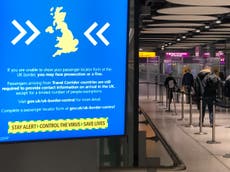What will ‘normal’ politics look like after the vaccine is rolled out? Here are some clues
Without coronavirus or Brexit, politics will look very different in 2021

Your support helps us to tell the story
From reproductive rights to climate change to Big Tech, The Independent is on the ground when the story is developing. Whether it's investigating the financials of Elon Musk's pro-Trump PAC or producing our latest documentary, 'The A Word', which shines a light on the American women fighting for reproductive rights, we know how important it is to parse out the facts from the messaging.
At such a critical moment in US history, we need reporters on the ground. Your donation allows us to keep sending journalists to speak to both sides of the story.
The Independent is trusted by Americans across the entire political spectrum. And unlike many other quality news outlets, we choose not to lock Americans out of our reporting and analysis with paywalls. We believe quality journalism should be available to everyone, paid for by those who can afford it.
Your support makes all the difference.I see the reviews of 2020 have started already; they seem to come earlier each year. We are all Captain Hindsight now.
We have been prompted to look back early because the election was a year ago today, a day that really was a break in our national story. Those three months between 12 December and 12 March, when the prime minister told us “many more families are going to lose loved ones before their time”, was a period of calm between two storms.
It was an interlude between two “total stories”, the journalistic equivalent of total war. For three and a half years, Brexit had dominated the news in a way few of us had known before. The final phase, with a deadlocked parliament, was particularly intense, and then, suddenly, we were back to what seemed like normality.
Brexit was done, in the legal sense of our membership of the EU ending, although anyone who read the small print knew the hard part was still to come; the Labour Party was preparing to elect a normal leader; and the government was plunged into a normal crisis, a row between No 10 and No 11 Downing Street that resulted in a dramatic but normal cabinet reshuffle and the astonishing but normal promotion of Rishi Sunak to be chancellor of the exchequer.
Politics for the foreseeable future seemed to be about whether a Conservative government could deliver the kind of investment in public services and high streets that its new voters wanted. That seemed like the start of a new story arc that would bend over the next four years of normal politics.
The Conservative Party in parliament was buoyant, its numbers refreshed by a diverse infusion of new members, especially from the north of England, and united in the afterglow of election victory in a way it had not been for many years.
And yet, on the day of the election a year ago, there was a four-year-old boy in a hospital in Milan who had been vomiting and found it difficult to breathe; he had a measles-like rash that puzzled doctors, who took a swab from the back of his throat on 5 December 2019. It was frozen and has just been retested, showing positive for coronavirus.
Those three months at the start of this year turned out to have been a phoney peace. The virus was apparently already in Europe, some time before the Chinese government confirmed human-to-human transmission on 20 January. Reading the minutes of the first meeting of Sage (the Scientific Advisory Group for Emergencies) convened to discuss the virus on 22 January is a salutary lesson: they knew it could be serious but had no evidence of “geographical spread unconnected to Wuhan”.
There is no need to recount what happened since. You were there. But now that the vaccine is here, and more vaccines are on their way, we can imagine life after coronavirus again.
Will politics go back to the post-election story? Actually, I suspect it will. There is a tendency after a national trauma as great as coronavirus to say that things will never be the same again. I wonder about that. The crisis will certainly have lasting effects on people’s opinions of Boris Johnson. His rating for competence was never high but it has taken a beating; and a minor aspect of the crisis, Dominic Cummings’s trip to Barnard Castle to test his eyesight, has inflicted disproportionate damage on the government’s reputation.
But the main legacy of coronavirus is the deep and lasting damage it has done to the national finances. Which means a big question for the rest of this parliament – assuming no more total news stories – may be Johnson’s struggle to avoid being accused of “austerity”.
Yet it is possible that he could succeed. If interest rates remain low, the national debt is sustainable, and Sunak may be in no hurry to balance the books. Just as Gordon Brown was reluctant to take unpopular decisions because he wanted Tony Blair’s job, so Sunak is just as keen as Johnson to avoid being labelled the oppressor of the middle and northern English taxpayer of modest means.
It may be that the New Labour model will be the guide for the next few years, just as it was, briefly, after the election: more public spending on schools, hospitals and the police. Beyond Brexit, Johnson won the election as New Labour, and intended to govern as New Labour – before the virus intervened. Once it has been controlled, he will return to that theme. He was at it again at Prime Minister’s Questions this week. “I am very proud that we are delivering on the people’s priorities,” he said – a New Labour phrase – boasting of recruiting police officers and nurses, building hospitals and “the biggest programme of infrastructure investment in this country for a century”.
Deal or no deal, Brexit really will be done, and Europe will go back to being a “normal” story, part of the bassline of British politics as it has been since the war. But the main political battle will be how to restore the sense of pride that people used to feel in the places where they live, the places that voted Conservative for the first time a year ago.
As Rachel Wolf, co-author of the Tory manifesto, put it this week: “They feel embarrassed and angry about what is happening to their towns. Shops are closed, the cenotaph has graffiti on it, people often feel unsafe.”
That is what “normal” politics looks like, and that is what will be fought over next.





Join our commenting forum
Join thought-provoking conversations, follow other Independent readers and see their replies
Comments